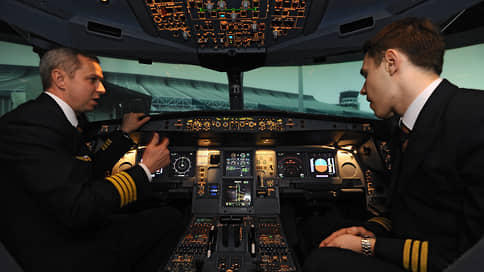Departure training – Newspaper Kommersant No. 171 (7372) dated 09/16/2022
[ad_1]

Pilots complain about the non-transparent practice of dismissals from airlines based on the results of internal exams. The Sheremetyevo trade union of the flight crew proposed to involve instructors from the Federal Air Transport Agency in the checks and give the pilots the opportunity to appeal the results. The airlines object that it is too expensive to fire pilots in this way, and it is the carriers who are responsible for safety and therefore must check their pilots themselves.
“Kommersant” got acquainted with the letter dated September 13, which the Sheremetyevo Aircrew Trade Union (SHPLS) sent to the Federal Air Transport Agency with complaints about “more frequent cases of attempts to dismiss crew members during extraordinary flight checks.” The check is carried out twice a year: on a flight simulator and during a regular flight with an instructor pilot. “The pilot does not pass it, since the airline has the task of reducing the number of personnel in any way,” the letter says. ShPLS proposes to create a department in the Federal Air Transport Agency, which will include “instructors for independent verification and evaluation of the professional skills of pilots.”
As Igor Deldyuzhov, president of ShPLS, explained to Kommersant, several dozen pilots from different airlines reported such a “compulsion to quit”.
The only way to appeal is to go to court. Rostransnadzor told Kommersant that pilots can file complaints there as well. The Ministry of Transport and the Federal Air Transport Agency declined to comment.
The existence of the problem “Kommersant” was confirmed by the pilots of the three largest airlines. According to the current pilot of Pobeda, who worked for Aeroflot for several years, “the discriminatory practice of an exam that is impossible to pass” existed in the largest Russian airline to “get rid of the most disloyal to management or odious pilots.” Difficulties with passing the internal exam, according to him, also began in Pobeda after the arrival of a new director for the organization of flight work, Alexander Kravchenko, in the spring, “and a clear overabundance of personnel” (until February, Pobeda was actively recruiting pilots).
Pobeda could lay off 150 to 170 pilots “in the foreseeable future” as its operating fleet is reduced to 30 aircraft, two industry sources said. About 250 more pilots of long-haul aircraft, according to a Kommersant source, “are regarded as an excess of staff” in Aeroflot. In Pobeda, Kommersant did not answer. Aeroflot assured that “crew reductions are not planned.” Rossiya is recruiting pilots from other types of aircraft with retraining for SSJs, the company told Kommersant. There are currently 72 SSJs in the fleet, but 40–45 SSJs fly daily. According to Kommersant’s information, an average of five to six crews (720-864 pilots) is expected per aircraft, while in Russia there are only about 420 pilots for this type.
Over the past six months, about 1,000 pilots have been left without work, says Miroslav Boichuk, president of the aircrew trade union.
In total, in the Russian Federation, according to the Council for Professional Qualifications of Air Transport (SPK BT), there are more than 9 thousand pilots. There are examples of unscrupulous prosecution of pilots in airlines, Mr. Boychuk admits. But conducting checks by experts from the Federal Air Transport Agency, he believes, will only create grounds for corruption: “Rosaviation is unlikely to be able to hire experts with salaries of 300 thousand rubles.”
The airlines also do not see the point in the changes. It is the carrier that is responsible for the readiness of pilots and flight safety, therefore, it must evaluate them itself, Red Wings emphasizes. They explain that every pilot must undergo eight hours of training on the simulator of his type of aircraft (recurrent rating) once every six months. For an airline, such a session costs €3,000-4,000. If the pilot does not give it up, the carrier bears the costs again. If the pilot fails again, they can be fired, “but such cases are rare in the industry.”
The dismissal scheme described by ShPLS is too complicated, notes a Kommersant source in a large company, “if there are extra pilots, they simply do not fly and receive a minimum fixed salary.”
Aeroflot told Kommersant that the proposal to introduce a “department of independent instructors” into the structure of the FAVT looks like “easing the requirements for pilot qualifications.” According to Aeroflot, the flight operations manual establishes a requirement for non-interference by management or external organizations in the activities of examiner instructors. The responsibility of the latter for bias is also established. The simulator is video-recorded – this also allows you to verify the objectivity of the assessment.
Foreign airlines also have internal checks, notes Pavel Semchenko, a pilot who worked in the United States, but if you disagree with the results, you can contact the FAA inspector or any independent center. Work on the creation of such independent centers in Russia is now being carried out by the SEC VT, says the head of its executive committee, Anastasia Miroshnichenko, this year it is planned to start training independent experts, as well as develop a professional standard for instructors.
[ad_2]
Source link





